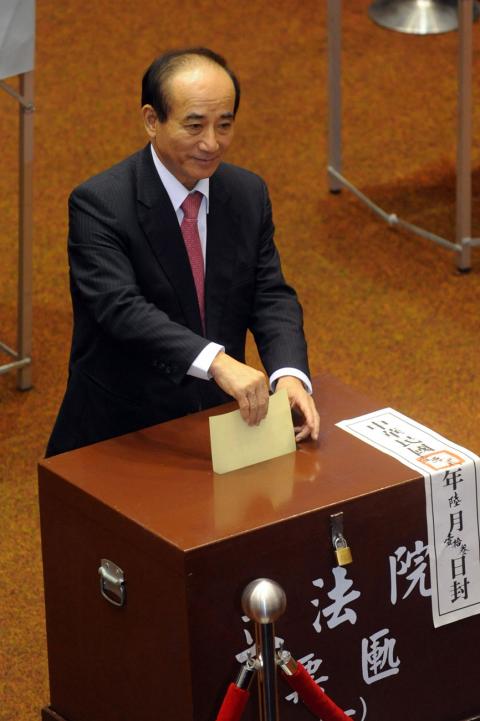The legislature yesterday unanimously supported the Executive Yuan’s veto of a controversial amendment to the Accounting Act (會計法) on the first day of a two-week extra session, temporarily snuffing a political firestorm.
A vote of 110 to zero means that the amendment, which would have exempted city and county councilors from charges of misusing public funds and released hundreds of academics from probes into their use of receipts to claim government funds, will be nullified.
Three of the 113 lawmakers did not vote yesterday afternoon, including Deputy Legislative Speaker Hung Hsiu-chu (洪秀柱), who is visiting China, independent Legislator May Chin (高金素梅) and Chinese Nationalist Party (KMT) Legislator Yen Kuan-heng (顏寬恆), who decided not to vote because the amendment could have exonerated his father, Yen Ching-piao (顏清標), an imprisoned former lawmaker.

Photo: CNA
The vote, at least for now, puts to rest one of the biggest legislative controversies of recent years after the public condemned the nation’s political parties for their “late-night secret deal” on the final day of the previous legislative session, when opposition parties, which favored the decriminalization of academics, collaborated with the KMT, which had an eye on getting Yen out of prison, in closed-door cross-party negotiations.
With its majority, the KMT dominated a morning vote on the agenda for the extra session.
Notable items among the 49 proposals included an amendment to the Income Tax Act (所得稅法), related to the controversial capital gains tax on securities transactions, and legislation related to the 12-year compulsory education system, pension reform and a national referendum on the construction of the Fourth Nuclear Power Plant in Gongliao (貢寮), New Taipei City (新北市).
The KMT also agreed to place proposals by the Democratic Progressive Party (DPP) and the Taiwan Solidarity Union (TSU) on legislation against monopolization in the media on the agenda.
However, the DPP’s “three anti-nuclear bills,” which are proposed amendments regarding the promotion of a nuclear-free homeland (非核家園推動法), and to the Nuclear Reactor Facilities Control Act (核子反應器設施管制法) and the Referendum Act (公投法), failed to make the list, despite them being supported by the TSU and the People First Party.
Premier Jiang Yi-huah (江宜樺) is scheduled to report to the legislature today on the 12-year compulsory education system, another disputed policy that could spur heated debate.
The controversial proposal for a referendum on the Fourth Nuclear Power Plant is scheduled for the latter part of the extra session, which concludes on June 27, KMT caucus whip Lin Hung-chih (林鴻池) said.

DAREDEVIL: Honnold said it had always been a dream of his to climb Taipei 101, while a Netflix producer said the skyscraper was ‘a real icon of this country’ US climber Alex Honnold yesterday took on Taiwan’s tallest building, becoming the first person to scale Taipei 101 without a rope, harness or safety net. Hundreds of spectators gathered at the base of the 101-story skyscraper to watch Honnold, 40, embark on his daredevil feat, which was also broadcast live on Netflix. Dressed in a red T-shirt and yellow custom-made climbing shoes, Honnold swiftly moved up the southeast face of the glass and steel building. At one point, he stepped onto a platform midway up to wave down at fans and onlookers who were taking photos. People watching from inside

A Vietnamese migrant worker yesterday won NT$12 million (US$379,627) on a Lunar New Year scratch card in Kaohsiung as part of Taiwan Lottery Co’s (台灣彩券) “NT$12 Million Grand Fortune” (1200萬大吉利) game. The man was the first top-prize winner of the new game launched on Jan. 6 to mark the Lunar New Year. Three Vietnamese migrant workers visited a Taiwan Lottery shop on Xinyue Street in Kaohsiung’s Gangshan District (崗山), a store representative said. The player bought multiple tickets and, after winning nothing, held the final lottery ticket in one hand and rubbed the store’s statue of the Maitreya Buddha’s belly with the other,

‘NATO-PLUS’: ‘Our strategic partners in the Indo-Pacific are facing increasing aggression by the Chinese Communist Party,’ US Representative Rob Wittman said The US House of Representatives on Monday released its version of the Consolidated Appropriations Act, which includes US$1.15 billion to support security cooperation with Taiwan. The omnibus act, covering US$1.2 trillion of spending, allocates US$1 billion for the Taiwan Security Cooperation Initiative, as well as US$150 million for the replacement of defense articles and reimbursement of defense services provided to Taiwan. The fund allocations were based on the US National Defense Authorization Act for fiscal 2026 that was passed by the US Congress last month and authorized up to US$1 billion to the US Defense Security Cooperation Agency in support of the

‘COMMITTED TO DETERRENCE’: Washington would stand by its allies, but it can only help as much as countries help themselves, Raymond Greene said The US is committed to deterrence in the first island chain, but it should not bear the burden alone, as “freedom is not free,” American Institute in Taiwan Director Raymond Greene said in a speech at the Institute for National Defense and Security Research’s “Strengthening Resilience: Defense as the Engine of Development” seminar in Taipei yesterday. In the speech, titled “Investing Together and a Secure and Prosperous Future,” Greene highlighted the contributions of US President Donald Trump’s administration to Taiwan’s defense efforts, including the establishment of supply chains for drones and autonomous systems, offers of security assistance and the expansion of